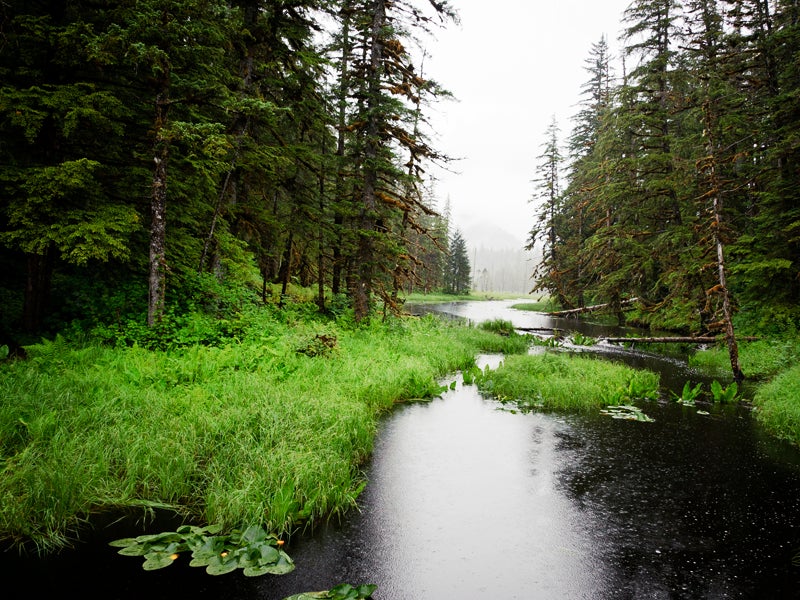Huge Victory from the Ninth Circuit Protects the Tongass National Forest
The Ninth Circuit Court of Appeals has protected the roadless portions of the Tongass National Forest—the largest and wildest national forest—from new road-building and logging.

This page was published 10 years ago. Find the latest on Earthjustice’s work.
I’m elated to tell you about a huge victory that will maintain protection for the roadless lands in the Tongass National Forest. Yesterday, the Ninth Circuit Court of Appeals, sitting in a rare, 11-judge en banc court, ruled that Bush-era action exempting the Tongass National Forest from the Clinton-era Roadless Rule is invalid. Yesterday’s decision will ensure that the roadless portions of the Tongass—the largest and wildest national forest in the U.S.—will be protected from new road-building and logging.
The Roadless Rule was enacted in the waning days of the Clinton administration in 2001. It was designed to protect “large, relatively undisturbed landscapes” in inventoried roadless lands within national forests.
The Roadless Rule prevents expensive and damaging new roads and clear-cuts in intact forests while allowing other economic development—including hydropower, transmission lines, mining and tourism projects—to proceed. The policy was designed to protect what the United States Department of Agriculture described as “roadless values”—scientific, environmental, educational, recreational and aesthetic attributes unique to these areas.
The Department of Agriculture explained that roadless values include healthy watersheds that provide clean water for domestic and agricultural uses, supporting healthy fish and wildlife populations. They also include “habitats for threatened and endangered species, space for wilderness recreation, environments for research, traditional cultural properties and sacred sites and defensive zones against invasive species.”
From the start the Department of Agriculture gave special consideration to the Tongass, a 16.8 million-acre forest in southeastern Alaska. As the Ninth Circuit noted in its ruling, “No other national forest received such special consideration in the department’s nationwide assessment of the proposed Roadless Rule.”
After much debate and roughly 1.6 million comments, the department decided that the Tongass should not be exempt from the Roadless Rule because it “would risk the loss of important roadless values” in the Tongass. But in 2003, the Bush administration reversed that decision. The Department of Agriculture adopted an exemption to the Roadless Rule for the Tongass, stating the rule wasn’t necessary to maintain those key roadless values.
Our case originated in 2009 when a diverse coalition of Alaska Native, tourism industry and environmental organizations, represented by attorneys from Earthjustice and the Natural Resources Defense Council, challenged the Bush Administration’s decision to exempt the Tongass.
In 2011, a federal judge agreed with the coalition that the decision was arbitrary and capricious. The federal government decided not to appeal, but the state of Alaska did. Last year, in a split decision, a three-judge panel of the Ninth Circuit sided with Alaska. We asked for a rarely granted full court rehearing of the case and the court agreed.
That final decision from the full court came down today. The en banc panel ruled the decision to exempt the Tongass National Forest from the Roadless Rule failed to “explain why an action that it found posed a prohibitive risk to the Tongass environment only two years before now poses merely a ‘minor’ one.”
This is an important decision that affirms a vital principle: Even when an administration changes, agencies cannot arbitrarily change policies. The victory would not have been possible without the tireless dedication of my colleagues, Earthjustice staff attorney Tom Waldo and managing attorney Eric Jorgensen, who have literally dedicated their professional careers to protecting the Tongass and its living inhabitants.
Most importantly, today’s decision is great news for the Tongass and for all those who rely on its roadless areas. The remaining wild and undeveloped parts of the Tongass are important fish and wildlife habitat and vital to residents and visitors alike for hunting, fishing, recreation and tourism, the driving forces of the regional economy.
To learn more about Earthjustice’s work in the Tongass, check out this feature: Saving the Forests for the Trees.
Opened in 1978, our Alaska regional office works to safeguard public lands, waters, and wildlife from destructive oil and gas drilling, mining, and logging, and to protect the region's marine and coastal ecosystems.